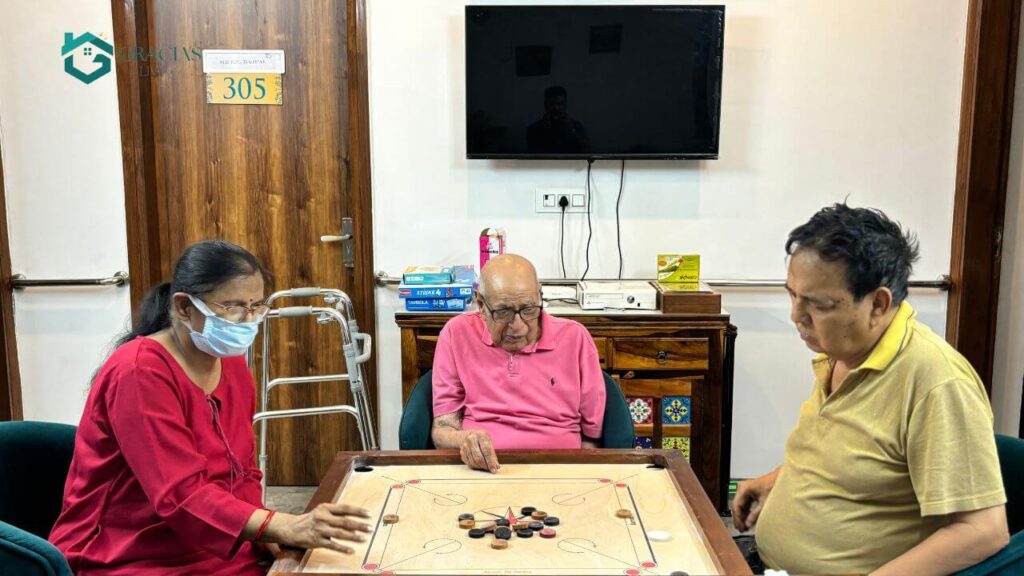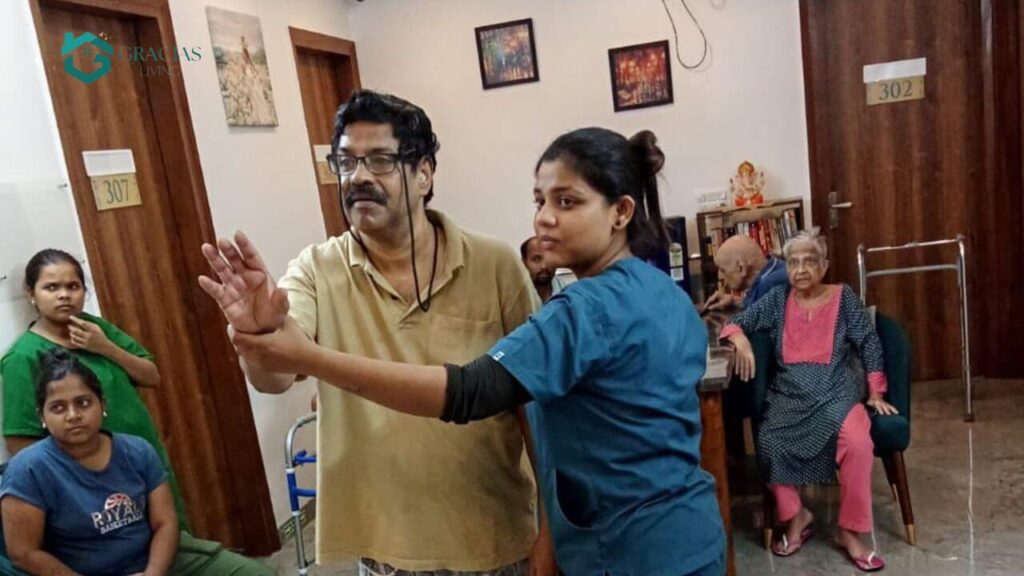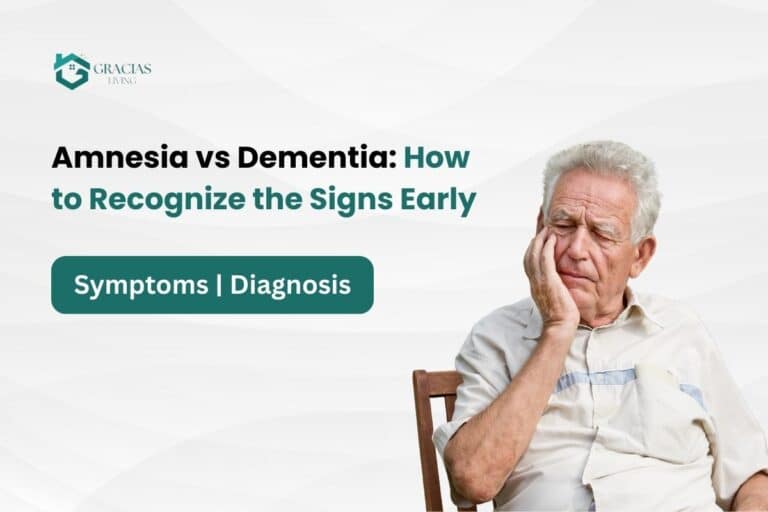Quick Summary of the article:
- Aggression in dementia is a common symptom, due to confusion and frustrations of individuals with dementia..
- Common symptoms of Dementia which leads to aggression are cognitive decline, communication difficulties, physical discomfort, and emotional distress.
- In dementia, understanding what triggers aggression in your loved one is the first step in managing it.
- Effective communication can help defuse the aggressive behavior of dementia patients.
- Seek professional help if aggression becomes severe and risks the life of Dementia Patients and caregivers.
One of the most difficult aspects can be managing aggression and agitation while caring for your loved one with dementia, which is a common symptom in dementia patients.
Aggression in dementia patients can manifest in various forms, including verbal outbursts, physical violence, and emotional distress.
It is essential to understand that these behaviors are not intentional but rather a result of the disease affecting the brain. Dementia can alter a person’s ability to communicate, comprehend their environment, and control their emotions, leading to frustration and aggression.
Understanding the causes of aggression, developing strategies to manage it, and knowing when to seek professional help is crucial in providing compassionate and effective care.
Caregivers need help and understanding to deal with aggression in dementia patients more effectively.

Common Causes of Aggression in Dementia Patients
“Do You Know that Dementia is the 7th leading cause of death globally”?
Aggression in dementia patients often arises from cognitive decline. As cognitive abilities fade, confusion and frustration increase.
Communication difficulties make it hard for patients to express their needs or understand others. Physical discomforts like pain or hunger can trigger aggression. Recognizing these triggers is key to managing aggression effectively.
1. Cognitive Decline:
As dementia stages progress, cognitive abilities decline, making it difficult for patients to understand and process information.
This confusion can lead to frustration and aggressive behavior.
2. Communication Barriers:
Dementia patients often struggle to express their needs or understand what others are saying. This communication gap can result in frustration and aggression.
3. Physical Discomfort:
Pain, hunger, fatigue, or other physical discomforts can trigger aggressive behavior in dementia patients.
They may not be able to articulate their discomfort, leading to outbursts.
4. Environmental Factors:
A chaotic or unfamiliar environment can be overwhelming for dementia patients. Loud noises, crowds, or sudden changes in surroundings can trigger aggression.
5. Emotional Distress:
Feelings of fear, anxiety, or depression are common in dementia patients and can lead to aggressive behavior.
They may feel threatened or misunderstood, resulting in defensive reactions.
At What Stage Does Aggression in Dementia Begin?
Aggression in dementia usually appears in the middle stage of the condition, when memory loss, fatigue, restlessness, confusion, and disorientation become more severe.
At this point, the person may feel frustrated because they cannot express their needs clearly or make sense of their surroundings.
Triggers such as pain, noise, fatigue, or unfamiliar environments can intensify aggressive behavior. While aggression is more common in moderate dementia, it can also occur in the later stages when communication becomes very limited.
Recognizing early signs and managing triggers can greatly reduce the frequency and intensity of aggression.
Changes Seen in Aggressive Dementia Patients
Early Stage (Mild Dementia)
In the first stage, symptoms are often subtle and may be mistaken for normal ageing. Common changes include:
- Forgetting recent events or conversations.
- Misplacing items more often.
- Struggling to find the right words.
- Difficulty managing finances or planning tasks.
- Mood changes like irritability or mild anxiety.
- Getting confused in new or unfamiliar places.
Middle Stage (Moderate Dementia)
As dementia progresses, changes become more noticeable and affect daily living:
- Forgetting the names of close family or friends.
- Repeating the same questions or stories.
- Needing help with dressing, bathing, or meals.
- Increased disorientation even in familiar surroundings.
- Clear changes in personality, self-talk, withdrawal, suspicion, or aggression.
- Disturbed sleep patterns and night wandering
- Reduced ability to judge safety.
Later Stage Severe Dementia
In advanced stages, patients become completely dependent on care:
- Inability to recognise loved ones.
- Losing the ability to walk, eat, or speak properly.
- Difficulty swallowing and a higher risk of infections.
- Complete reliance on caregivers for all daily needs.
Strategies and Tips for Managing Aggressive Dementia Patients

Aggression is a common challenge in dementia care, and it often arises from fear and confusion. Families and caregivers can ease such situations by responding with patience and thoughtful strategies.
Understanding what triggers aggression in your loved one is the first step in managing it. Once you identify the triggers, you can work on minimizing or avoiding them.
Regular meal times, activities, and bedtime can reduce anxiety.
Here are some practical tips:
1. Stay Calm and Reassuring
When a person with dementia exhibits aggression, maintain a gentle tone and relaxed body language. A calm response helps reduce tension and reassures them that they are safe.
2. Identify the Triggers
Aggression often has a cause, pain, hunger, poor lighting, fatigue, or even too much noise. Observe patterns and try to remove or reduce these triggers before they escalate.
3. Offer Simple Choices
Instead of overwhelming them with instructions, provide limited, clear options like “Would you like tea or water?” This gives them a sense of control and reduces frustration.
4. Redirect with Activities
Engage them in something soothing, such as listening to music, folding towels, wiping plates, or taking a short walk. Gentle redirection can shift their focus away from aggression.
5. Ensure Physical Comfort
Check if they are too hot, cold, hungry, or in pain. Meeting basic physical needs quickly can prevent irritability and aggressive behavior.
Caring for someone with dementia requires empathy and patience. By creating a supportive environment and responding thoughtfully, families can manage aggression more effectively and protect both the patient’s dignity and their peace of mind.
6. Effective communication
Speak in a calm, soothing tone, and maintain a relaxed body language. Speak slowly and use short, clear sentences. Show that you are listening and understanding their concerns.
Use nods, eye contact, and gentle touches to convey empathy. Acknowledge their emotions without arguing or dismissing them. Saying things like, “I understand you’re upset,” can help them feel heard.
“WHO publishes detailed guidelines on lifestyle and behavioral interventions to delay or reduce cognitive decline and dementia risk”.
Seek Professional Help to manage aggression in dementia patients
Despite our best efforts, there may be times when managing aggression becomes overwhelming or unsafe.
In such cases, seeking professional help and early diagnosis is crucial. Here are some indicators that it might be time to involve healthcare professionals:
1. Frequent and Severe Aggression:
If aggressive episodes become more frequent or severe, it may indicate that the patient’s condition is worsening or that their needs are not being adequately met.
2. Risk of Harm:
If the patient poses a risk of harm to themselves or others, immediate intervention from healthcare professionals is necessary.
3. Caregiver Burnout:
Caring for a dementia patient can be physically and emotionally draining. If you are experiencing burnout, it’s important to seek support to ensure your well-being and the quality of care you provide.

4. Unresolved Medical Issues:
If you suspect that medical issues, such as infections or medication side effects, are contributing to aggression, consult with a healthcare professional for a thorough evaluation.
Healthcare professionals can offer various interventions to help manage aggression in dementia patients. These may include:
1. Medication: In some cases, medications such as antipsychotics, antidepressants, or mood stabilizers may be prescribed to manage aggression. These should be used under strict medical supervision due to potential side effects.
2. Behavioral Therapy: Behavioral therapy can help identify and modify triggers and responses to aggression. Therapists can work with both the patient and the caregiver to develop coping strategies.
3. Support Groups: Joining a support group for caregivers can provide emotional support, practical advice, and a sense of community.
Sharing experiences with others who understand your challenges can be incredibly helpful.
Maintaining Calm While Handling Aggression in Dementia Patients
Staying calm while handling aggression in dementia patients is essential. Remember, their behavior is a symptom of the disease, not a personal attack.
Practice deep breathing, use positive self-talk, and approach the situation with empathy. Create a peaceful environment by reducing noise and clutter, and maintain a non-confrontational demeanor.
If overwhelmed, take a brief break to regroup. Seek support from others to share the caregiving load. Prioritize self-care to maintain resilience.
By remaining composed and empathetic, you can effectively manage aggression and provide compassionate care.

Your Dementia Care Expertise with Gracias Living
At Gracias Living, we specialize in personalised dementia care for our residents. Our trained caregivers understand the emotional, physical, cognitive, behavioral, and social changes seniors face at every stage of dementia.
We also consider nutritional, environmental, spiritual, cultural, psychological, and social needs, along with safety, recreational, rehabilitative, medical, cognitive, emotional, and lifestyle aspects, ensuring the holistic well-being of our beloved seniors.
We offer emotional support, social connection, mental activities, physical care, spiritual comfort, cultural engagement, and recreational opportunities that keep life balanced and joyful.
At Gracias Living, we walk with you through the dementia journey. Here, your loved one is never just a patient; in fact, they are part of a Gracias Living family where they feel valued and respected.
Conclusion
Dealing with aggression in dementia patients is undoubtedly challenging, but with patience, empathy, and effective strategies, it is possible to manage these behaviors and provide compassionate care.
Caregivers need lots of patience and empathy to manage aggression in dementia patients with greater confidence and compassion.
Remember, you are not alone on this journey. Reach out to healthcare professionals, support groups, and resources available to you.
By taking a proactive and compassionate approach, you can sail through the complexities of dementia care and improve the quality of life for your loved one.
Frequently Asked Questions
1. How to treat aggression in dementia?
Stay calm, remove triggers, and redirect with soothing activities. Meet basic needs and create a safe, peaceful setting.
2. What are the most common causes of aggression in dementia patients?
Pain, confusion, frustration, loud environments, hunger, tiredness, and sudden changes in routine often trigger aggression.
3. Why do people with dementia become aggressive?
They struggle to express needs or understand surroundings, and this confusion often shows as anger or aggression.
4. How long does the aggressive stage of dementia last?
It usually appears in the middle stage and may continue later. Good care and routines reduce its frequency and intensity.
5. Can a dementia patient get better?
Dementia cannot be reversed, but with care, therapy, and support, patients can live calmer, safer, and more dignified lives.




